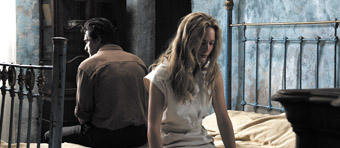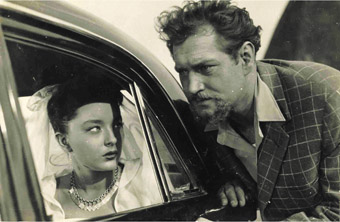the cross-currents of new russian film
tom redwood: russian resurrection film festival preview

The Banishment
RUSSIAN CINEMA IS CURRENTLY IN THE MIDST OF A RENAISSANCE. OF THIS THERE CAN BE NO DOUBT. WITH THE GREAT FILMMAKING INSTITUTIONS OF THE SOVIET UNION NOW A DISTANT MEMORY, THE RUSSIAN FILM INDUSTRY HAS BUFFETED THE WINTER OF TRANSFORMATION AND RE-EMERGED IN THE 21ST CENTURY TO A DIVERSE AND FERTILE MARKETPLACE. RUSSIA’S DOMESTIC BOX OFFICE RECORDS ARE BEING CONSISTENTLY BROKEN BY LOCALLY-MADE PRODUCTIONS, AND MORE THAN A COUPLE OF EMERGING RUSSIAN FILMMAKERS ARE MAKING SERIOUS INROADS INTO THE INTERNATIONAL FESTIVAL CIRCUIT.
Indeed, so healthy is the state of Russian cinema that some critics have begun talking of a “new wave” in Russian filmmaking. I’m not sure the term is apt. Contemporary Russian cinema is too disparate and multifaceted to be swept along in one direction. But as an acknowledgment of industrial progress, if not for any ideological or stylistic consistency, the idea of a Russian “new wave” is certainly justifiable. After almost disappearing in the years immediately following the break-up of the Soviet Union, the film industry (like many industries in today’s “new” Russia) has steadily grown over the past decade to now re-assume a significant measure of international stature. Since 1998, each passing year has witnessed an increase in film productions, with a high proportion of these being made by first time directors. This establishment of a wide platform of emerging talent (of not only directors, but actors and crew), coupled with the willingness of the Russian state and big business to invest in domestic productions, has meant that strong foundations have been laid for a very productive, varied and potentially enduring industry. In a time when West European and Hollywood cinemas seem locked in a state of creative recession, and when even East Asian cinemas seem a little quiet, Russian cinema is on the march. Creative and financial chances are being willfully taken. Gambles are ventured without the guarantee of healthy returns (a concept that Hollywood producers could reacquaint themselves with). And even if not all of these are successful—even if bad films are still made in Russia as in any other country—the boldness and confidence that pervades contemporary Russian filmmaking is refreshing.
Australians will have a chance to taste the vitality of this new Russian cinema when the Russian Resurrection Film Festival returns for its fifth annual season. Established in 2003, the festival has grown substantially over recent years, branching out from its original venues in Melbourne and Sydney to now include screenings in Adelaide, Brisbane, Canberra and Perth. And much like the national industry it showcases, the festival shows all the signs of further growth. Last year former Russian president Vladmir Putin lent political weight when he opened the Sydney wing of the festival (giving Australian politicians a hint of the importance that some governments place on their national cinemas). And with 2007 audiences up 55% on the previous year, organisers of the 2008 festival are hoping for an even bigger turn-out this time around. I was grateful to festival organisers for a brief peep at some of the headline features.

Amphibian Man
No doubt the festival drawcard for local cinephiles is Andrei Zvyagintev’s The Banishment. A Russian-Belgian co-production, The Banishment arrives on our shores shrouded in both mystery and anticipation. Following the media sensation that surrounded Zvyagintev’s debut feature The Return (which won the Golden Lion at Venice in 2003), details of The Banishment were kept under strict wraps until the film’s release last year. The Siberian born director Zvyagintev even went to Kubrickian lengths, going into hiding to avoid the press. Thankfully the results have proven worth the trouble. The Banishment, I am happy to confide, is a demanding, enigmatic and masterful film confirming Zvyagintev’s status as a rare genius of narrative cinema. This is a major event in world cinema, a genuine example of film art, and should not be missed by any serious filmgoer. The Banishment won the Best Actor award at the 2007 Cannes Film Festival for Konstantin Lavronenko.
In the crime thriller Vice, director and co-writer Valery Todorovsky revisits the Russian underground he so successfully explored a decade ago in Land of the Deaf. Vice follows the descent of young hipster Denis (Maxim Metveyev), a dance club disc jockey whose dreams of a life beyond the mundane lead him into an uncompromising relationship with lonely, sociopathic mobster Verner (Fedor Bondarchuk). Denis soon discovers that it’s easy to make friendships, but hard to break them off. With some fine performances, blistering scenes of violence and a peculiarly bleak Russian denouement, Vice is an effectively paced crime drama, a much darker film than it seems at first.
Aleksei Popogrebsky’s award-winning feature Simple Things is an entertaining and surprisingly evocative example of cinematic understatement. The film gently portrays the less than remarkable, though still thoroughly unmanageable, mid-life crisis of St. Petersburg anesthetist Sergei Maslov. A kindhearted-without-being-prissy film that was lauded with prizes at Eastern European festivals last year, Simple Things stands out in its national context as a unique, semi-precious gem—an antidote to the darkness of Zvyagintev’s harrowing epic.
Other films to be screened at the festival include Karen Shakhnazarov’s latest feature Vanished Empire (which plays alongside the director’s Glasnost-era classics Zero City and We are Jazz Men) and a retrospective of Soviet fantasia’ cinema to be headlined by the enormously popular 1962 oddity Amphibian Man. Come and sing along to the adventures of Ichtyandr, boy with gills. For Sydney audiences there’s also a special treat on November 9 at City Recital Hall, where the SBS Youth Orchestra perform the original Dmitri Shostakovich score to Gregoriy Kozintsev and Leonid Trauberg’s 1929 silent film New Babylon.
2008 Russian Resurrection Film Festival: Melbourne: Palace Cinema Como, October 29-Nov 5; Canberra: Greater Union Manuka, Oct 30-Nov 3; Sydney: Chauvel Cinema, Oct 31–Nov 10; Brisbane: Palace Centro Cinema, Nov 6-12; Perth: Cinema Paradiso, Nov 13-19; Adelaide: Palace Nova Eastend, Nov 14-19; www.russianresurrection.com
RealTime issue #87 Oct-Nov 2008 pg. 28






